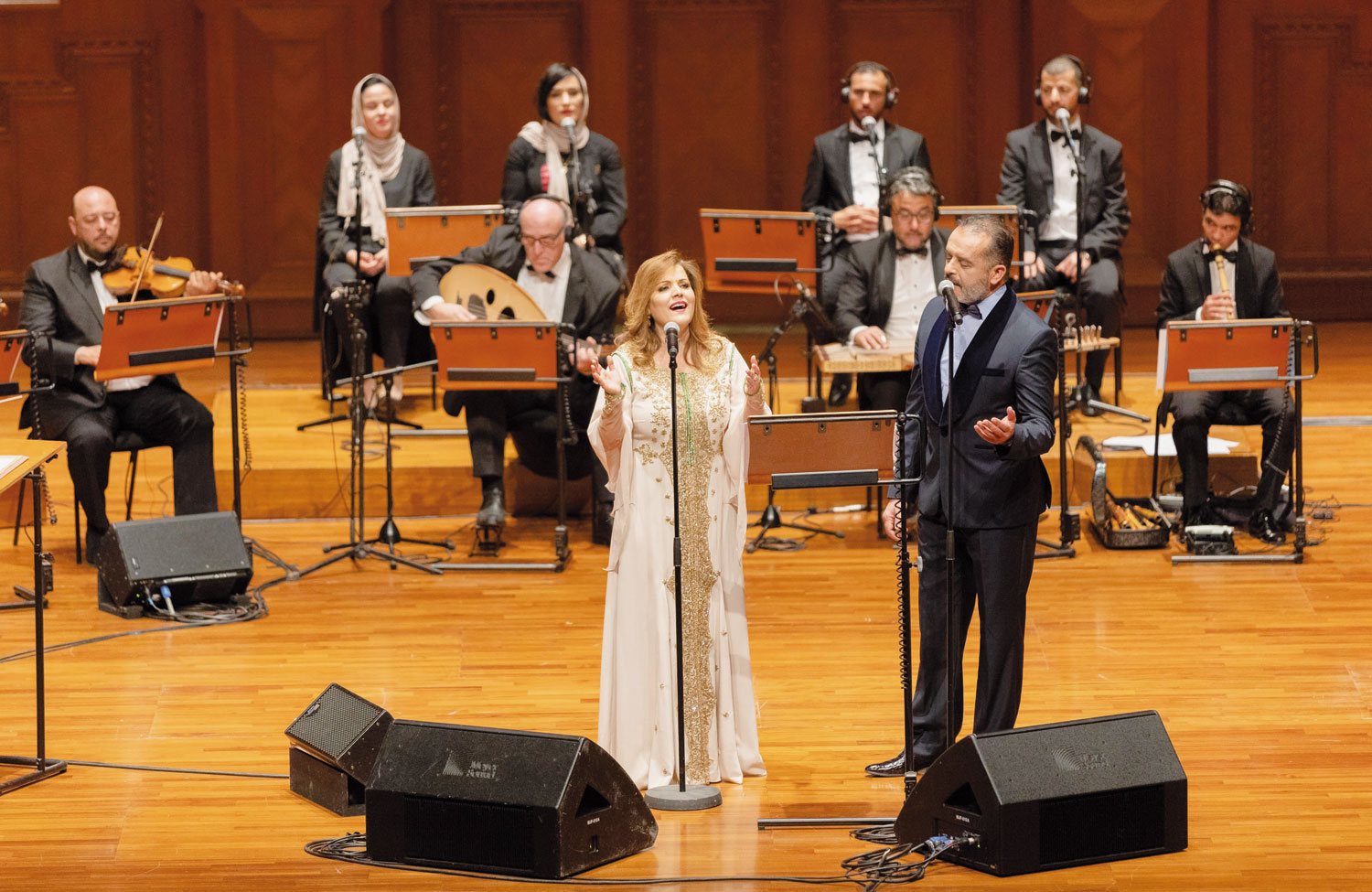

The Tunisian singer, Leila Hejaiej, has earned herself the nickname, ‘Lady Tarab’. On her second visit to the Royal Opera House Muscat on Friday night, however, she became Queen of Heart and Soul as she moved the audience with her heartfelt performance of classical Tunisian ‘malouf’. With Leila came the fifty-one-year-old Tunisian singer, Mohamed al Jebali who opened the show, turning what should have been a two-hour performance into a lengthy three hours – a challenge for even the most dedicated music-lovers, let alone those hungry for dinner by 10 pm.
The Opera House made an unusual arrangement of single-price tickets with open seating, so when doors opened at 6.30pm the auditorium quickly filled up from the front – a nice touch enabling the performers to play to a sea of faces with no gaps or empty seats. Another nice effect was leaving the house lights up enough for viewers to read programme notes, and singers to watch audience expressions and reactions.
The singers were accompanied by an excellent ensemble of sixteen musicians and four unnamed backing-singers under the capable baton of thirty-eight year old Tunisian, Dr Lassoued, leader of the National Music Group of Tunis. There was no drum-kit which made a refreshing change to the ensemble sound.
Leila Hejaiej comes from a musical family and started singing when she was just four years old. She gave her first concert when she was fourteen, and from then her career has grown and blossomed, appearing in the Carthage and Hammamet International Festivals. Now, as an academic, mother and artist, Muscat has reaped the rewards of that experience. Resplendent in white and gold, she sang in a highly decorated classical Arabic style, her smoky voice accessible and inviting, enhanced by smiling facial expressions and hand gestures. Her set opened with a piano and bass introduction to ‘Nauba Khadra’, with broad washes of string colours and typically Arabic rhythmic sequences until the slow, sultry voice of the soloist began. Leila has a way of telling a story through each song, drawing the listener in and carrying them along with the narrative.

Leila welcomed the audience in Arabic and English, saying she hoped they enjoyed the performance and that ‘the Tarab lifts your soul’. An enchanting Nay solo from Hsin Miloud with some Double Bass pizzicato from Najib Belhedi introduced ‘Madunak’. Leila was always accurate and well-controlled in her delivery, even in difficult decorated passages. She first performed at ROHM with Lofti Bushnak in 2013 and she explained that his composition, ‘Dour Sah el Amal’ is on her recent CD. Leila sang its lyrical tune beautifully, first in unison with the backing singers and lovely use of the ensemble’s colours, and then in dialogue with them. She is a real, natural singer, in her own words she ‘finds herself ‘ in the music which flows so effortlessly from within. In ‘Maqadeer’, introduced by Nay and strings without piano, she made a pleading entry of the memorable melody in her high tessitura which turned upbeat in the propelling rhythmic section. The uneven metre in ‘Rubaiyat Omar Khayyam’ exploited her resonant deep register, gradually rising to a happier place in a Sufi-like reverie. This extended song in many sections, featuring some fine Oud playing from Moez Ouekdi, lasted around fifteen minutes. Much lighter in mood, the tuneful, accessible, ‘Ya Habibi Taala’ was a tribute to St. Valentine’s and opened with a jazz-piano solo from Riadth Bedoui, almost Spanish in its rhythmic break, with Slim Jaziri on Qanoon. The next piece, ‘To Tunis’ was amazingly evocative; a Klezma-cabaret, with bass-Nay sounding like a haunting saxophone and slow, sultry vocals. It concluded Hejaiej’s 75-minute set and she brought back Mohamed AlJebali for three Finale songs. She thanked Muscat for the opportunity to perform and said how lovely Oman is. It was delightful to hear them sing together in the ‘Song to Muscat’. However people began to drift away before the end, tummies rumbling and eyes heavy, as they sang a new duet, just composed by conductor, Dr Lassoued. Their voices blended so well in the folklore, one could have had more of that instead of Jebali’s over-an-hour opening solo set.
The evening had begun with Concert-Master, Abdel Basset Metsahel, wandering confidently across the stage, performing the violin solo in his romantic, film-style instrumental composition, ‘Dhiyaa’, with piano introduction and Qanoon-Nay dialogue in a timeless, relaxed Arabic Waltz.
Mohamed al Jebali strode on, serious and handsome, and sang al Mogi’s, ‘Gabbar’ – a slow, dark song in his clear, well-placed bass voice, famous for his astounding breath-control. A familiar waltz took over which surprisingly quoted Duke Ellington’s ‘Caravan’ in the strings! Mohamed did not address the audience throughout his set, but sung from his heart with passion, eyes closed and seriously focused. Jebali’s own, ‘Kul Shai Intaha’ in a lively Arabic rhythm finally drew a more animated performance and response, ending with a syncopated surprise. The audience started to liven up in the final medley of Abdel Halim Hafez songs, composed by Baligh Hamdi. They called and whooped, clapping and singing along to the familiar love songs which reached quite a popular climax in an impressive percussion break. But this was really two concerts-in-one; each singer deserved their own platform and combining them simply stretched the audience appreciation too thinly.
STORY By GEORGINA BENISON
PHOTOS BY KHALID AL BUSAIDI
Oman Observer is now on the WhatsApp channel. Click here



